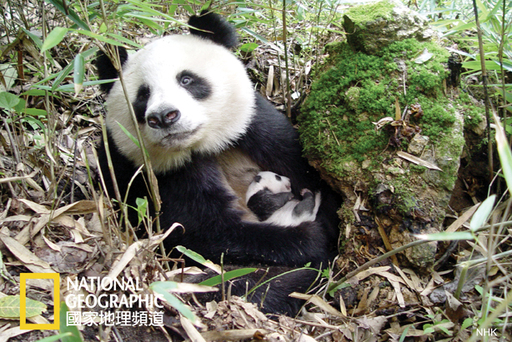Giant Pandas
National Geographic Channel follows a team of filmmakers as they search for giant pandas1 in the heart of China. The team goes high into the misty2 Qinling Mountains in order to understand more about the giant pandas' complex lives. These rare animals were once found all over China, but now there are only small numbers of them scattered across the central region. This fact, the harsh weather conditions, and the rough terrain3 are all challenges the team must face to make "Giant Pandas."
Pandas live in places over 1,500 meters high, and it is around this altitude that the team finds its first clue—panda droppings4. Ninety-nine percent of a panda's diet is bamboo, but they can't digest it well. Therefore, they must spend up to 16 hours a day eating roughly 18 kilograms of it. This would be like a human eating 40 loaves5 of bread each day!
After 10 days, the team climbs to 3,000 meters and finally finds panda activity. They catch a glimpse of a rare sight—pandas gathering together in the wild. Usually pandas live alone unless it is a female taking care of her cub.

國家地理頻道跟隨一組製片人員,一同進入中國內地尋找大熊貓。小組人員登上濃霧深鎖的秦嶺,以便進一步瞭解大熊貓複雜的生活型態。這些罕見的動物曾一度在中國遍處可尋,如今卻只零星分布在中部地區。此一事實,以及嚴酷的氣候條件和崎嶇的地勢,都是攝影小組在拍攝《大熊貓》時所必須面臨的挑戰。
熊貓棲息在高度為一千五百公尺以上的高山裡,而小組成員正是在這個高度左右發現熊貓蹤跡的第一條線索--熊貓糞便。熊貓的飲食中有百分之九十九都是竹子,不過牠們卻無法妥善地消化這種食物。因此牠們一天得花長達十六個小時吃下大約十八公斤的竹子。這相當於一個人每天要吃下四十條麵包!
十天之後,攝影小組登上三千公尺的高度,並終於發現熊貓活動的身影。他們瞥見到難得的一幕--熊貓在野地中群聚在一起。通常熊貓會離群索居,除非是母熊貓要照顧牠的寶寶。
《Building Your Vocabulary》
1. scattered a. 分散的,稀疏的
The books are scattered around his room.
他的房間裡到處散落著書本。
2. harsh a. 嚴峻的,惡劣的
The living conditions in this area are harsh.
這個地區的生活條件十分惡劣。
3. clue n. 線索;提示
Give me some clues, and I will be able to guess the answer to your riddle.
給我一些提示,我就能猜出你謎語的答案來。
4. diet n. 日常飲食
Rice is a main part of an Asian's diet.
米飯是亞洲人日常飲食中最主要的一環。
5. digest vt. 消化
A cup of tea will help you digest your food.
喝一杯茶有助你消化食物。
6. unless conj. 除非,如果不
Unless you work hard, you won't succeed.
如果你不努力工作,就不會成功。
《Phrases for Learning》
1. up to... 多達∕高達……
This bus can carry up to 70 people.
這輛巴士能搭載多達七十人。
2. catch a glimpse of... 一瞥……
I was lucky to catch a glimpse of my idol.
我幸運地瞧見了我的偶像。
《Extra Word》
1. panda n. 熊貓(本文中亦作形容詞用)
2. misty a. 多霧的
3. terrain n. 地形,地勢
4. droppings n.(恆為複數,鳥獸的)糞便
5. loaf n.(麵包的)一條
《TIPS IN USE》
Therefore, they must spend up to 16 hours a day...
(因此牠們一天得花長達十六個小時……)
1. 本句中的"up to..."表『多達∕高達……』。
Up to 40,000 people took part in this event.
(多達四萬人參與了這項活動。)
2. "be up to..."則表『做……(秘密的事或壞事)』。
I wonder what Gary is up to now.
(真不知道蓋瑞現在又在幹什麼勾當。)
3. "be up to..."亦表『勝任∕有資格做……』。
Kai's boss thinks he is up to the task.
(阿凱的老闆認為他能勝任這項任務。)
4. "be up to + 人"又表『由某人作主』。
What we do this Sunday is up to you.
(我們這個星期天要做什麼由你來決定。)
Pandas live in places over 1,500 meters high, and it is around this altitude that the team finds its first clue—panda droppings4. Ninety-nine percent of a panda's diet is bamboo, but they can't digest it well. Therefore, they must spend up to 16 hours a day eating roughly 18 kilograms of it. This would be like a human eating 40 loaves5 of bread each day!
After 10 days, the team climbs to 3,000 meters and finally finds panda activity. They catch a glimpse of a rare sight—pandas gathering together in the wild. Usually pandas live alone unless it is a female taking care of her cub.

國家地理頻道跟隨一組製片人員,一同進入中國內地尋找大熊貓。小組人員登上濃霧深鎖的秦嶺,以便進一步瞭解大熊貓複雜的生活型態。這些罕見的動物曾一度在中國遍處可尋,如今卻只零星分布在中部地區。此一事實,以及嚴酷的氣候條件和崎嶇的地勢,都是攝影小組在拍攝《大熊貓》時所必須面臨的挑戰。
熊貓棲息在高度為一千五百公尺以上的高山裡,而小組成員正是在這個高度左右發現熊貓蹤跡的第一條線索--熊貓糞便。熊貓的飲食中有百分之九十九都是竹子,不過牠們卻無法妥善地消化這種食物。因此牠們一天得花長達十六個小時吃下大約十八公斤的竹子。這相當於一個人每天要吃下四十條麵包!
十天之後,攝影小組登上三千公尺的高度,並終於發現熊貓活動的身影。他們瞥見到難得的一幕--熊貓在野地中群聚在一起。通常熊貓會離群索居,除非是母熊貓要照顧牠的寶寶。
《Building Your Vocabulary》
1. scattered a. 分散的,稀疏的
The books are scattered around his room.
他的房間裡到處散落著書本。
2. harsh a. 嚴峻的,惡劣的
The living conditions in this area are harsh.
這個地區的生活條件十分惡劣。
3. clue n. 線索;提示
Give me some clues, and I will be able to guess the answer to your riddle.
給我一些提示,我就能猜出你謎語的答案來。
4. diet n. 日常飲食
Rice is a main part of an Asian's diet.
米飯是亞洲人日常飲食中最主要的一環。
5. digest vt. 消化
A cup of tea will help you digest your food.
喝一杯茶有助你消化食物。
6. unless conj. 除非,如果不
Unless you work hard, you won't succeed.
如果你不努力工作,就不會成功。
《Phrases for Learning》
1. up to... 多達∕高達……
This bus can carry up to 70 people.
這輛巴士能搭載多達七十人。
2. catch a glimpse of... 一瞥……
I was lucky to catch a glimpse of my idol.
我幸運地瞧見了我的偶像。
《Extra Word》
1. panda n. 熊貓(本文中亦作形容詞用)
2. misty a. 多霧的
3. terrain n. 地形,地勢
4. droppings n.(恆為複數,鳥獸的)糞便
5. loaf n.(麵包的)一條
《TIPS IN USE》
Therefore, they must spend up to 16 hours a day...
(因此牠們一天得花長達十六個小時……)
1. 本句中的"up to..."表『多達∕高達……』。
Up to 40,000 people took part in this event.
(多達四萬人參與了這項活動。)
2. "be up to..."則表『做……(秘密的事或壞事)』。
I wonder what Gary is up to now.
(真不知道蓋瑞現在又在幹什麼勾當。)
3. "be up to..."亦表『勝任∕有資格做……』。
Kai's boss thinks he is up to the task.
(阿凱的老闆認為他能勝任這項任務。)
4. "be up to + 人"又表『由某人作主』。
What we do this Sunday is up to you.
(我們這個星期天要做什麼由你來決定。)

